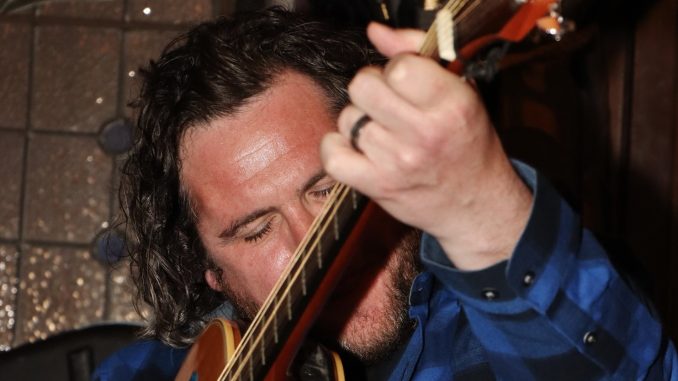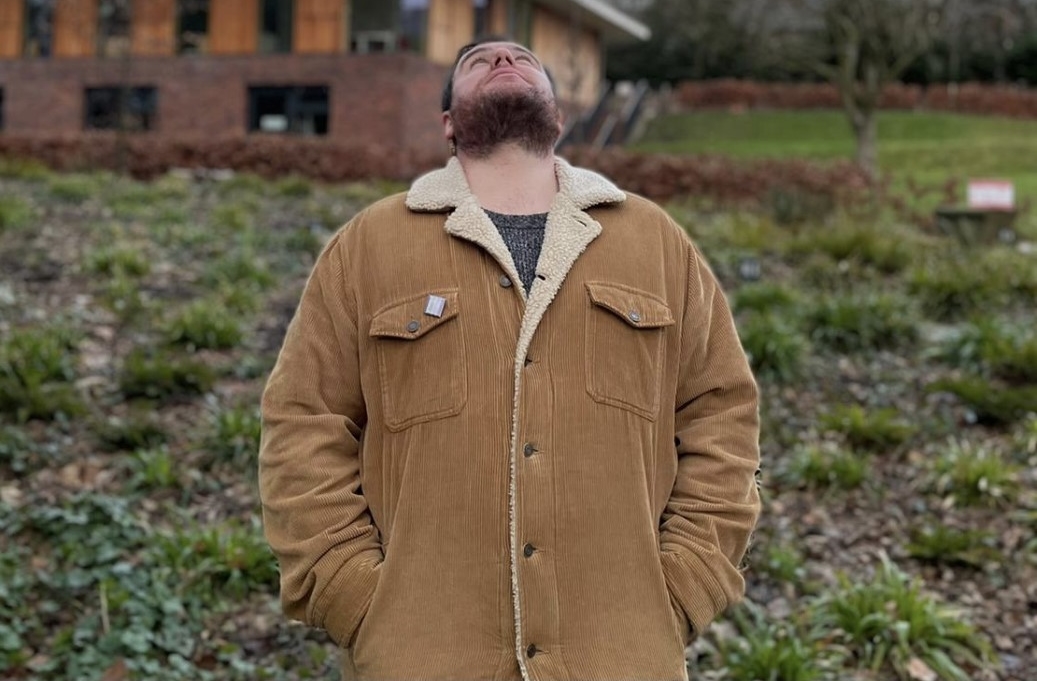
How watching his Mum getting ready to go out dancing inspired the musical career of Only Child.
It is a long time since the heyday of Merseybeat and the Beatles, but Liverpool still has a vibrant music scene that exhibits a sense of artistic honesty and social awareness. One such artist is Alan O’Hare AKA Only Child, who is about to release his fourth album in ten years, ‘Straight Lines’, which is looking like the best album of his career if early feedback is anything to go on. Americana UK’s Martin Johnson caught up with Alan O’Hare over Zoom to discuss his new album ‘Straight Lines, whether there is any difference between Only Child the band and Alan O’Hare musician, the influence Liverpool has had on his songwriting and how he is looking for the universality of emotion and humanity within the local colour. Alan O’Hare is also that rare breed of artist who genuinely believes that music has the power to change lives and society, and he cites his own experience as proof. Despite a journalistic ploy to spark some rivalry between O’Hare and Liverpool legend Ian Prowse, he refused to take the bait and confirmed the influence Ian Prowse has had on him as a musician, and celebrates their friendship and shared admiration of Bruce Springsteen.
How are you, are things more or less back to normal as a working musician following the pandemic?
Gigs are back, musicians can gather to play and record, so I’d say yes. However, there’s still a hangover: tickets are shifting slower across the board from the top down, we haven’t had a festival season yet and there’s still caution from lots of people. We have to respect that, too.
How do you describe Only Child as a working unit and the music you make?
Only Child is me and whoever amongst my musician friends has a spare hand! I play solo, we do support gigs as a fiddle and guitar acoustic duo and put the band together for big gigs. Once a year, I also do a gig with a string quartet as the sound of the violin has dominated the band since day one. We make emotional music, which means that no matter if it’s a ballad or a rocker, it has to come from a source that’s looking to connect on an emotional level. I mean, laughter is an emotion so it’s not life and death all the time, just most of it.
Your output has been steady over the years but not particularly prolific, what is the history behind ‘Straight Lines’?
It’s our fourth album in ten years. In between, there’s been a handful of EPs that were released that way due to artistic decisions (a theme for a set of songs) or the vicissitudes of the music business (having product out to play gigs). I will say I think an artist should never record everything they write or release everything they record, you have to be harsh when it comes to self-editing.
How did you record ‘Straight Lines’ and were all the songs written specifically for the record?
We started recording at the start of 2020, stopped for a year due to lockdowns and the pandemic, then started again in 2021. The songs were picked before recording began, but one or two dropped out and one or two were added due to the longer gestation. Once the album started talking to me about six songs in, I knew what tunes would make the grade and what wouldn’t. You have to listen to what your music is telling you.
Who do you think the audience is for ‘Straight Lines’?
Pre-orders have flown in and the most I’ve ever done with Only Child. But I don’t look for an audience, I write what’s true and trust it’ll find a connection once I release it. I’m not interested in chasing something. Looking out from the stage, I’d say our audience are drinkers who like a soundtrack!
Your music is heavily associated with Liverpool, does this help or hinder getting your message and music across to a wider audience?
It’s not something I think about. ‘Scouse’, for example, is an immigration song as opposed to being about Liverpool. Surroundings influence all artists and I’m no different. The place I live in just happens to speak with a bigger voice and centre on big themes and that works its way in. I write about emotion and humanity, they’re universal themes. If the people and places that infiltrate the lyrics give it a provincial feel, then so be it. Liverpool is very often the place where the songs are born.
How do you approach songwriting, are you disciplined, or do you just wait for the muse to come?
I wait. But I also believe you have to be constantly ready to receive. I surround myself with people, music, books, culture, ale, pubs, talking, it’s all in there. You have to have your ear to the ground and the rewards will come. I treat any muse that may exist with respect and respond accordingly when it visits.
Which songs are you most proud of on ‘Straight Lines’?
I’m too close to them and the record has only just been born. If pushed, ‘Everybody Comes From Something’ captures a lot of what I feel musically and lyrically.
Who took the cover photograph for ‘Straight Lines’?
A guy called Rob who manages The Kooks and Michael Kiwanuka. He’s from Penny Lane like me and I came across the shot online.

You are known for your socially conscious lyrics – do you think music has the power to change society?
It changed mine! Absolutely. I’m living proof… that’s what ‘Straight Lines’ and ‘… And The Band Played On’ are about: music helped me grow emotionally and politically and I know dozens more just like me. It’s the most important thing in the world and it hurts me to see it devalued and removed from the mainstream.
Who are the musicians who made you want to choose music as a career for yourself?
Noel Gallagher. Kate Bush. John Lennon. Smokey Robinson. But my Mum is the real answer, she made putting a record on or going on a night out to dance seem like the greatest thing a person could do. And she was right.
Ian Prowse is known as the Scouse Springsteen – is there any friendly rivalry between the two of you?
Ha, ha! Ian’s an old friend and we’ve travelled across Europe to see Springsteen together. He’s one of my very favourite songwriters and I’m proud to call him my mate. Without his influence, I may never have been moved to stand on a stage and do it properly. Rivalry? I owe him more than he’ll ever know.
You’ve trailed ‘Straight Lines’ with a number of singles over quite a few months, what has been the response, and has the advent of streaming helped or hindered Only Child’s career?
The response had been great and like I say, more pre-orders than ever before. The three singles have done well and brought new ears in, whereas people who follow my music have all said at various stages “That’s the best one yet.”, so that’s lovely. Streaming has hindered music full stop. It could be a great thing, but it’s not and until it is, it’s a problem in the continuing devaluation and attack on music in the mainstream. You won’t hear Only Child on Spotify, we’re a Bandcamp and “come to the gigs and buy the product” kinda’ band.
What is next for Alan O’Hare and Only Child in 2022?
The fourth album coming out, launch gig at The Music Room inside Liverpool’s Philharmonic Hall on March 18th. Then we have support gigs in different places with My Darling Clementine and Awkward Family Portraits. After that, we build to a tenth anniversary of the band show in Liverpool with a string quartet in September. We’re working on a vinyl release to accompany that.
At AUK, we like to share music with our readers, so can you share which artists, albums, or tracks are currently top three on your current personal playlist?
Anais Mitchell, Cowboy Junkies, Villagers.
Finally, do you want to say anything to our readers?
Thank you for supporting a website that loves music. There’s more of us than we think, let’s stay together and help each other keep music in the mainstream.
Only Child release ‘Straight Lines’ independently on 18th March with a launch party at Liverpool Philharmonic.



Very cool interview with Alan O’Hare (Only Child). Loved the track, too. I look forward to the album coming out on the 18th.
I’m glad you liked AUK’s chat with Al. Hopefully, “Straight Lines” will be a break-through album.